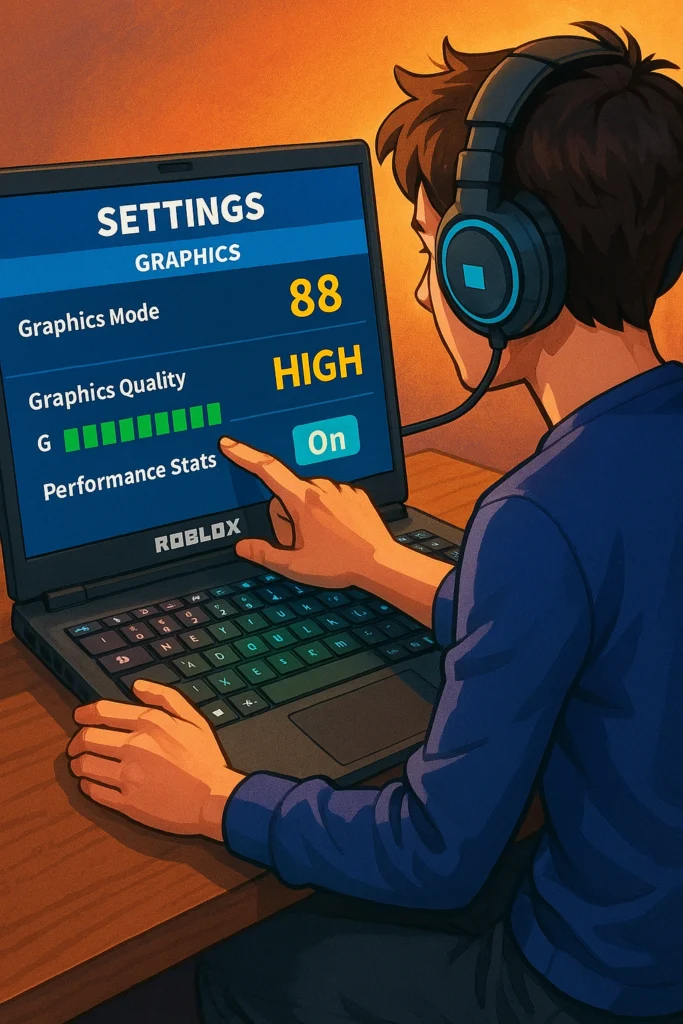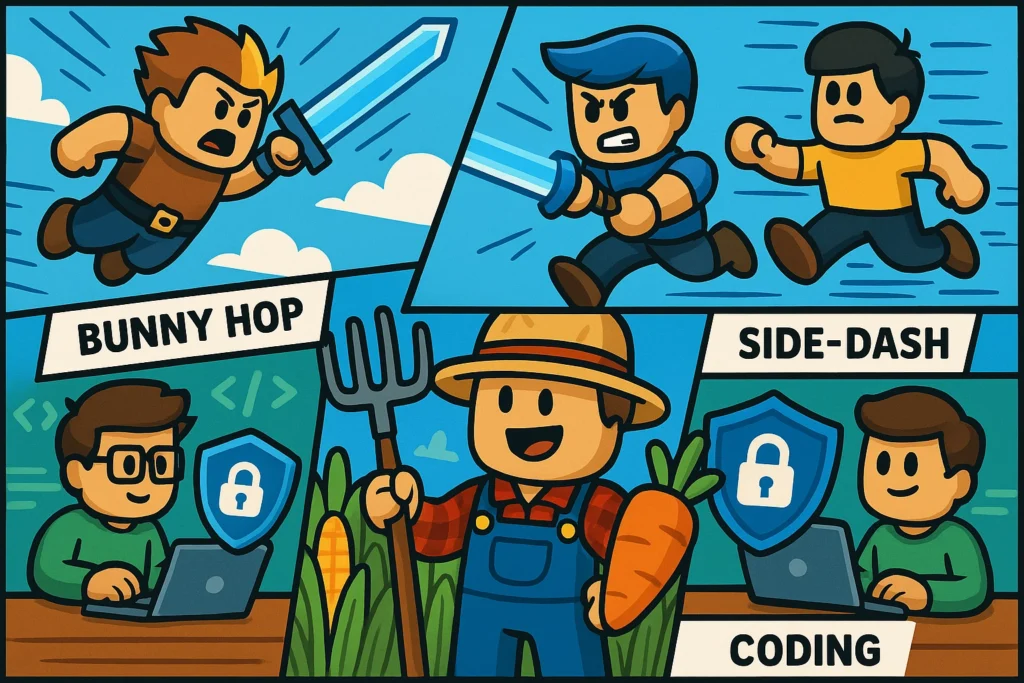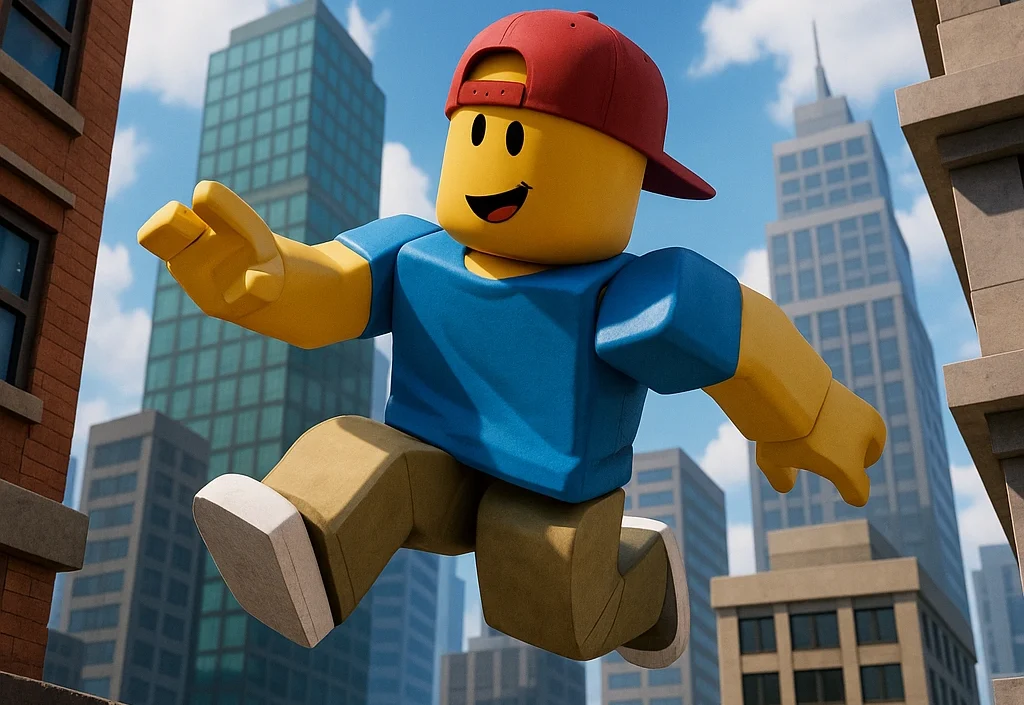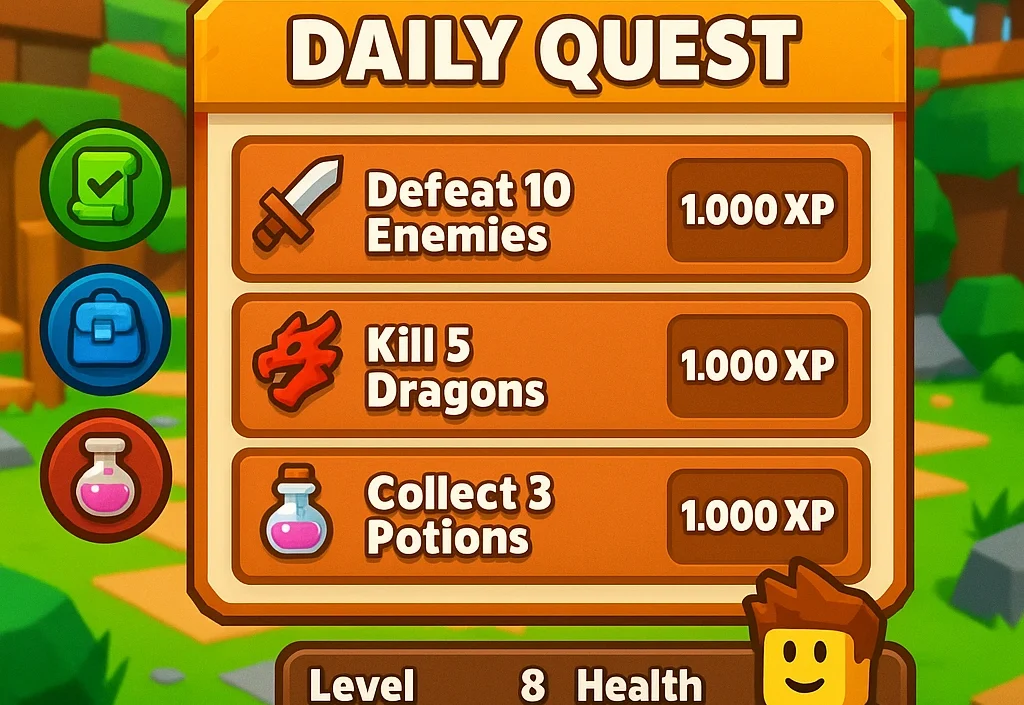
Smooth frames make every obby jump easier and every PvP duel snappier. Yet many creators and players still suffer from choppy visuals, input lag, and random stutters. The good news? Roblox now lets you raise its built-in frame cap and fine-tune graphics like never before.
This article walks through the exact settings, Windows tweaks, and lightweight tools that push your frames per second (FPS) as high as your hardware allows—without sacrificing safety or visuals.
Table Of Contents
1. Start With In-Game Settings
| Setting | What to Change | Why It Matters |
|---|---|---|
| Graphics Mode | Manual | Gives you full control instead of Roblox’s auto scaler |
| Graphics Quality | Lower until FPS stabilises | Each click down can add 10–30 FPS on low-end PCs |
| Maximum Frame Rate | 120 / 144 / 240 Hz (match your monitor) | Built-in cap unlock removes need for third-party unlockers |
| Reduce Motion | On (low-end) | Disables camera bobs & particle overdraw for easier frames |
How to change them
- Press Esc → Settings while in any experience.
- Switch Graphics Mode to Manual.
- Drop Graphics Quality one notch at a time until gameplay feels fluid.
- Set Maximum Frame Rate to the next value your monitor supports (e.g., 144 Hz if you own a 144 Hz panel).
- Click Resume and test.
Tip: Use Shift + F5 to show the live FPS counter. Aim for a stable number above 60.
2. Windows Tweaks That Add Free FPS
Applying a few built-in Windows optimisations can reclaim 10–15% performance without extra software.
- Enable Game Mode (Settings → Gaming) to place Roblox at the front of the CPU queue.
- Turn On Hardware-Accelerated GPU Scheduling (Settings → System → Display → Graphics) for smoother frame delivery on modern GPUs 8.
- Set Roblox.exe to High Performance in the same Graphics panel to force dedicated GPU usage.
- Close background apps—especially browsers, recorders, and RGB suites that hog memory.
- Update GPU drivers monthly; outdated drivers can throttle DirectX 10+ calls Roblox relies on.
3. Optional Tools for Extra Headroom
Roblox’s new frame-rate slider makes external “unlockers” mostly obsolete, but two community tools still add real value:
Bloxstrap
An open-source alternative launcher that lets you import pre-tuned FastFlag packs, disable memory-hungry shadows, and show Discord Rich Presence—no .ROBLOSECURITY cookie needed.
- Download from the official GitHub release page.
- Install the .NET 6 runtime when prompted.
- In Configure → Engine FastFlags, paste a low-end or Vulkan-boost preset to cut CPU draw calls.
LagoFast / NoPing Boosters
These paid/freemium apps close unnecessary Windows services and reroute network traffic to steadier routes, trimming input delay and ping spikes.
Safety first: avoid shady “one-click boosters” that promise 500 FPS. Stick to well-reviewed options or native settings.
4. Hardware Tweaks That Matter
If you’re still capped by silicon, focus on the parts Roblox uses most:
- CPU clock speed beats core count. A quad-core at 4 GHz outperforms an eight-core at 2 GHz in single-threaded physics.
- Single-channel RAM can bottleneck integrated GPUs. Add a second stick to enable dual-channel bandwidth.
- Move Roblox to an SSD to slash map loading times and stutter caused by asset streaming.
- Keep temps low. Thermal throttling can drop FPS by 30% after just ten minutes of gameplay. Use a laptop cooling pad or clean desktop dust filters.
Recommended Spec Targets (2025)
| Build Tier | CPU | GPU | RAM | Expected FPS |
|---|---|---|---|---|
| Entry (Laptop) | 2-core 1.6 GHz | Intel HD 620 | 4 GB | 40–60 FPS |
| Mid | Core i3 2120 | GTX 750 Ti / R7 240 | 8 GB | 80–120 FPS |
| High | Core i5 12400 | RTX 2060 Super | 16 GB | 144–240 FPS |
5. Keep Your Worlds Lightweight (For Creators)
Developers can help everyone’s FPS by:
- Disabling CastShadow on tiny props, lights, and foliage.
- Switching to Voxel lighting for stylised builds; reserve Future tech for showcase maps only.
- Streaming terrain and large meshes so only nearby geometry renders.
- Capping high-rate loops with
task.wait()and caching expensive calculations.
Go to our performance masterclass for more dev-side tricks: Master Roblox Like a Pro: 25 Essential Tips & Tricks.
Conclusion
A buttery-smooth Roblox session is just a few toggles away. Start by forcing Manual graphics, lifting the in-game FPS cap, and applying Windows’ built-in gaming modes. If you crave the last 20 FPS, experiment with Bloxstrap FastFlags or a reputable booster—then keep your drivers and temps under control. Enjoy the newfound responsiveness, and go claim that leaderboard spot!
FAQs
Q1. Does setting 240 FPS harm low-end PCs?
No, but you’ll see wild frame swings if your hardware can’t reach that cap. Match the slider to a value your average FPS can sustain.
Q2. Is Roblox FPS Unlocker still safe to use?
The original unlocker is now redundant; Roblox’s native slider does the same job without injecting memory.
Q3. Will lowering resolution improve FPS?
Yes. Dropping from 1080p to 900p can free 15–25% GPU load on integrated graphics.
Q4. Can VPNs really fix lag?
Only if your ISP routes poorly to Roblox servers. A gaming-optimised VPN such as ExpressVPN may cut ping in congested regions.
Q5. Why does my FPS drop after 30 minutes?
Likely thermal throttling or memory leaks. Clean fans, use a cooler, and close unused browser tabs.



